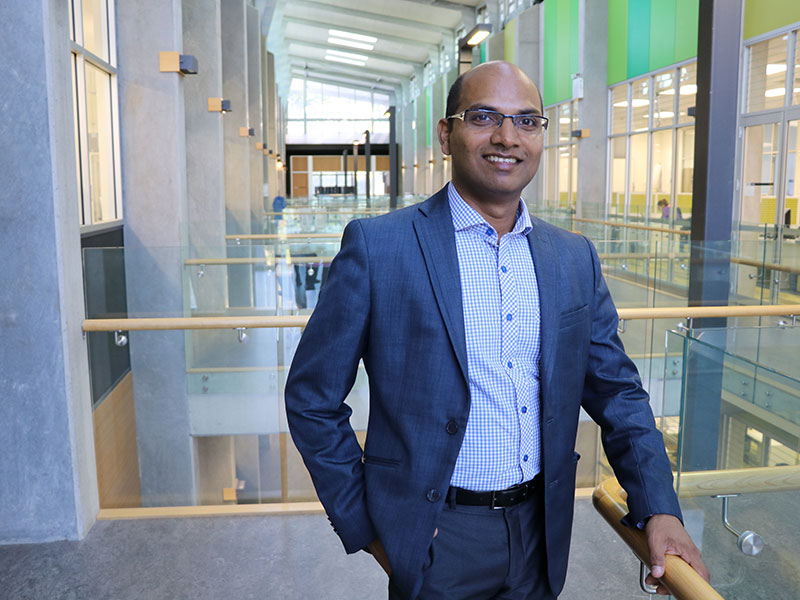Researcher Highlights
From humble beginnings
Professor Ajayan Vinu
Growing up in a humble home in India, it was Professor Ajayan Vinu’s family who encouraged him to achieve a higher education, translating their own dreams into reality.

“My father can’t read or write in English and my mother is illiterate, but they had a passion and the determination to support their children,” Professor Vinu explained.
“I didn’t really have a vision for myself with no one in my village successful in academia, so it was the push from my family which drove me to pursue a better life.”
Now a globally acclaimed material scientist and Australia’s leading nanotechnologist, Professor Vinu is driven by a personal philosophy to give back and help others.
Beginning with an undergraduate degree in Chemistry, he developed a determination to succeed from a young age.
“The system doesn’t work the same way that it does here [Australia]. Everything is theoretical in India, there is no practical experience. You have to put in the extra effort to really drive your own success.”
Nanomaterials as a solution to global challenges
After completing a Masters in Chemistry with first class from Manonmanium Sundarnar University, Tamil Nadu, India, Professor Vinu’s career continued to flourish, which he puts down to his determination.
“When studying I don’t just memorise things – I understand the principles and ask questions like why, how and what. Once you understand the basic principles of a subject, it’s easy to answer anything.”
Impressing his supervisors, Professor Vinu left India after obtaining a prestigious doctorate fellowship on immobilising biomolecules in a nanoporous system in Germany, going on to further respected positions in Japan and Australia, including International Young Scientist Fellow and Future Fellowship.
Teaching himself many scientific principles, Professor Vinu has honed his passion and experience working with nanomaterials, devoting his career to exploring their development, capabilities and applications in energy generation and storage, drug delivery, carbon capture and conversion, and catalysis.
Just a couple of the projects under his leadership include utilising nanomaterials to convert carbon dioxide into clean fuel with only sunlight and water, value adding products through catalytic pathway, utilising nanoporous architectures for developing next generation energy storage and conversion devices, and the selective removal of cancer causing molecules.
A centre for innovation
Now the Director of the University of Newcastle’s Global Innovative Centre for Advanced Nanomaterials, Professor Vinu is leading the charge in translating basic materials research into real-world products.
The centre has established a global research environment with a high standard of novel ideas for developing excellent advanced technologies for the betterment of society, specifically looking at energy, environment and health solutions.
“How do we do that in nanomaterial? We design a series of advanced nanostructures with different and unique properties suited to a purpose.
“The centre is not only developing innovative materials by using nanotechnology, but also improving their performance by tuning surface functionalities, structure, morphology and textural properties for applications in various fields including carbon capture and conversion, solar and fuel cells, catalysis, biotechnology, drug delivery, water treatment, and sensors.”
Save the world and help the people
Thinking back to his roots, Professor Vinu is focused on working to nurture the next generation of brilliant minds with a motto in mind – save the world and help the people.
“My father always said education is the building block for everything and I am very thankful to have been given the opportunities he himself was never given.”
“Helping the people through my work in science is my passion. I’ve achieved a great deal and now I want to give back to society.
“One of the highlights of leading this centre is the vibrant research groups comprised of leading researchers from all over the world who are working together to develop innovative materials and technologies through advanced infrastructure and innovation in materials science research and education.
“This global materials science platform offers creative approaches with innovation solutions for tackling global problems, which makes us unique from other centers established in Australia and other countries.
“I hope by nurturing the young people I now work with, I will play a part in fostering the next generation of leaders in the scientific world, and our work in advanced nanomaterials will revolutionise people and the world,” Professor Vinu said.
The University of Newcastle acknowledges the traditional custodians of the lands within our footprint areas: Awabakal, Darkinjung, Biripai, Worimi, Wonnarua, and Eora Nations. We also pay respect to the wisdom of our Elders past and present.
